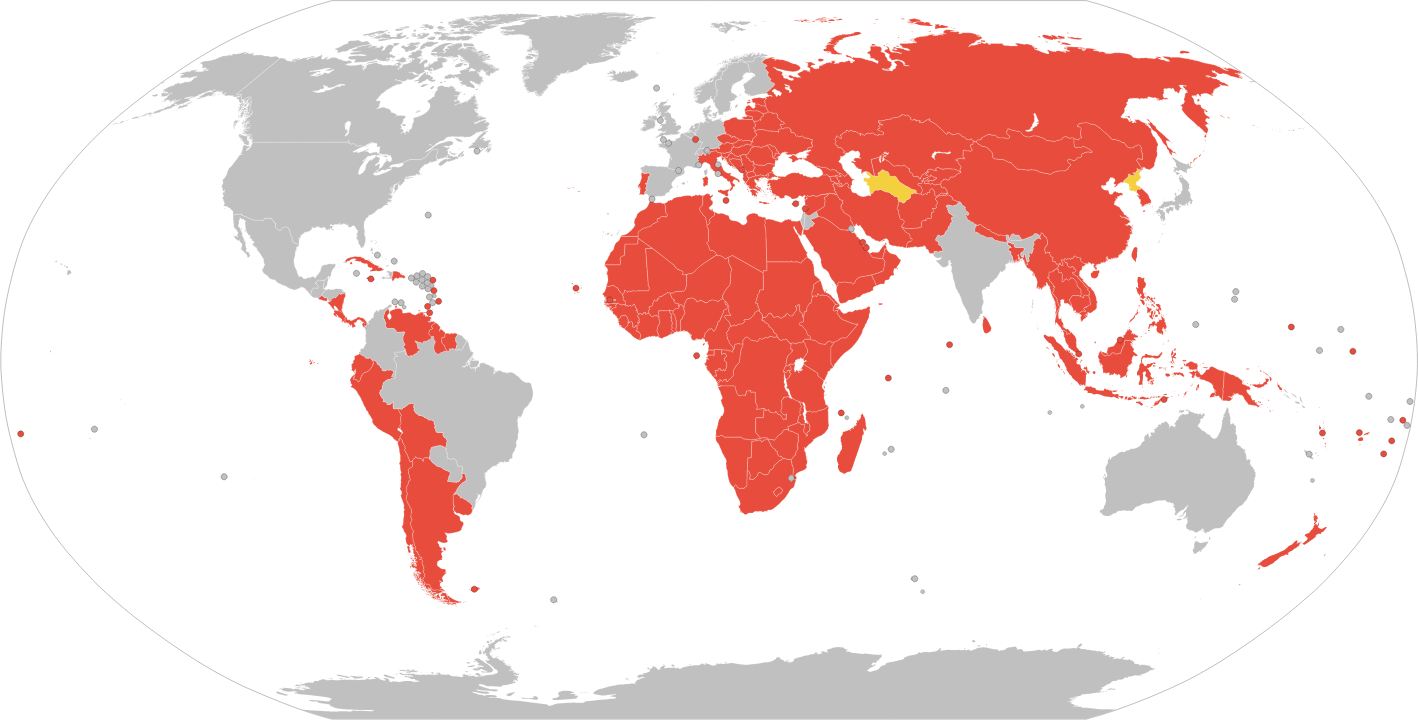More languages
More actions
Jucheguevara (talk | contribs) (added new source) Tag: Visual edit |
Spookfessor (talk | contribs) (Replaced outdated map) Tag: Visual edit |
||
| Line 1: | Line 1: | ||
[[File: | [[File:BRI agreements.png|alt=All countries that either attended a BRI summit (yellow) or who signed cooperation documents related to the BRI (red)|thumb|Countries currently in the Belt and Road Initiative]] | ||
The '''Belt and Road Initiative''' ('''BRI''') is a global infrastructure development strategy adopted by the [[China#Governance|Chinese government]] in 2013 to invest in nearly 70 countries and international organizations. It is considered a centerpiece [[Xi Jinping]]'s foreign policy.<ref>{{News citation|title=President Xi proposes Silk Road economic belt|url=https://www.chinadaily.com.cn/china/2013xivisitcenterasia/2013-09/07/content_16951811.htm}}</ref> | The '''Belt and Road Initiative''' ('''BRI''') is a global infrastructure development strategy adopted by the [[China#Governance|Chinese government]] in 2013 to invest in nearly 70 countries and international organizations. It is considered a centerpiece [[Xi Jinping]]'s foreign policy.<ref>{{News citation|title=President Xi proposes Silk Road economic belt|url=https://www.chinadaily.com.cn/china/2013xivisitcenterasia/2013-09/07/content_16951811.htm}}</ref> | ||
| Line 8: | Line 8: | ||
In 2021, [[Republic of Cuba|Cuba]] has joined the BRI project for the purpose of expanding its telecommunications and green energy industries.<ref>{{News citation|journalist=|date=2021-10-18|title=Cuba Formally Joins China's Belt and Road Energy Partnership|url=https://www.telesurenglish.net/news/Cuba-Formally-Joins-Chinas-Belt-and-Road-Energy-Partnership-20211018-0016.html|newspaper=[[TeleSUR]]|archive-url=|archive-date=|retrieved=}}</ref> Syria has also joined.<ref>{{News citation|date=2022-12-01|title=Syria Officially Joins China's Belt and Road, Seeking Lifeline to Defy U.S. Sanctions|url=https://www.newsweek.com/syria-officially-joins-chinas-belt-road-seeking-lifeline-defy-us-sanctions-1668849}}</ref> In February 2022, [[Argentine Republic|Argentina]] joined the BRI.<ref>{{News citation|date=2022-02-06|title=Argentina officially joins BRI in major boost for China-Latin America cooperation|url=https://www.globaltimes.cn/page/202202/1251555.shtml|newspaper=Global Times|retrieved=2022-02-08}}</ref><ref>{{News citation|journalist=[[Benjamin Norton]]|date=2022-02-12|title=Trapped in IMF debt, Argentina turns to Russia and joins China's Belt & Road|url=https://youtu.be/NZzATH_759s|newspaper=[[Multipolarista]]}}</ref> | In 2021, [[Republic of Cuba|Cuba]] has joined the BRI project for the purpose of expanding its telecommunications and green energy industries.<ref>{{News citation|journalist=|date=2021-10-18|title=Cuba Formally Joins China's Belt and Road Energy Partnership|url=https://www.telesurenglish.net/news/Cuba-Formally-Joins-Chinas-Belt-and-Road-Energy-Partnership-20211018-0016.html|newspaper=[[TeleSUR]]|archive-url=|archive-date=|retrieved=}}</ref> Syria has also joined.<ref>{{News citation|date=2022-12-01|title=Syria Officially Joins China's Belt and Road, Seeking Lifeline to Defy U.S. Sanctions|url=https://www.newsweek.com/syria-officially-joins-chinas-belt-road-seeking-lifeline-defy-us-sanctions-1668849}}</ref> In February 2022, [[Argentine Republic|Argentina]] joined the BRI.<ref>{{News citation|date=2022-02-06|title=Argentina officially joins BRI in major boost for China-Latin America cooperation|url=https://www.globaltimes.cn/page/202202/1251555.shtml|newspaper=Global Times|retrieved=2022-02-08}}</ref><ref>{{News citation|journalist=[[Benjamin Norton]]|date=2022-02-12|title=Trapped in IMF debt, Argentina turns to Russia and joins China's Belt & Road|url=https://youtu.be/NZzATH_759s|newspaper=[[Multipolarista]]}}</ref> | ||
== Reactions == | ==Reactions== | ||
The BRI has been demonized by Western [[bourgeois media]] on the basis that it's a "debt trap"<ref>{{News citation|title=China's debt-trap diplomacy|url=https://thehill.com/opinion/international/551337-chinas-debt-trap-diplomacy|newspaper=The Hill}}</ref> or an example of so-called "Chinese imperialism," but these claims serve only propaganda purposes and are not founded in evidence.<ref>{{News citation|title=Debunking the Myth of ‘Debt-trap Diplomacy’|url=https://www.chathamhouse.org/2020/08/debunking-myth-debt-trap-diplomacy|newspaper=Chatham House}}</ref><ref>{{News citation|title=The Chinese 'Debt Trap' Is a Myth|url=https://www.theatlantic.com/international/archive/2021/02/china-debt-trap-diplomacy/617953/|newspaper=The Atlantic}}</ref><ref>{{News citation|title=Catagorically Debunking the Claim that China is Imperialist|url=https://orinocotribune.com/catagorically-debunking-the-claim-that-china-is-imperialist/}}</ref> | The BRI has been demonized by Western [[bourgeois media]] on the basis that it's a "debt trap"<ref>{{News citation|title=China's debt-trap diplomacy|url=https://thehill.com/opinion/international/551337-chinas-debt-trap-diplomacy|newspaper=The Hill}}</ref> or an example of so-called "Chinese imperialism," but these claims serve only propaganda purposes and are not founded in evidence.<ref>{{News citation|title=Debunking the Myth of ‘Debt-trap Diplomacy’|url=https://www.chathamhouse.org/2020/08/debunking-myth-debt-trap-diplomacy|newspaper=Chatham House}}</ref><ref>{{News citation|title=The Chinese 'Debt Trap' Is a Myth|url=https://www.theatlantic.com/international/archive/2021/02/china-debt-trap-diplomacy/617953/|newspaper=The Atlantic}}</ref><ref>{{News citation|title=Catagorically Debunking the Claim that China is Imperialist|url=https://orinocotribune.com/catagorically-debunking-the-claim-that-china-is-imperialist/}}</ref> | ||
| Line 15: | Line 15: | ||
Anti-imperialist journalist Richard Medhurst has reported that China's BRI project is helping to rebuild the economies that have been destroyed by Western wars and sanctions.<ref>{{News citation|date=2022-01-25|title=Syria Officially Joins China's Belt and Road Initiative {{!}} BRI|url=https://youtu.be/b8bFjhiwvnw}}</ref> | Anti-imperialist journalist Richard Medhurst has reported that China's BRI project is helping to rebuild the economies that have been destroyed by Western wars and sanctions.<ref>{{News citation|date=2022-01-25|title=Syria Officially Joins China's Belt and Road Initiative {{!}} BRI|url=https://youtu.be/b8bFjhiwvnw}}</ref> | ||
== References == | ==References== | ||
<references /> | |||
Revision as of 02:37, 15 March 2022

The Belt and Road Initiative (BRI) is a global infrastructure development strategy adopted by the Chinese government in 2013 to invest in nearly 70 countries and international organizations. It is considered a centerpiece Xi Jinping's foreign policy.[1]
The BRI is one of the many factors which is leading to de-dollarization[2] the decline of the influence of the US empire,[3] and enhanced economic growth of non-aligned countries.[4]
The project has a target completion date of 2049.[5]
In 2021, Cuba has joined the BRI project for the purpose of expanding its telecommunications and green energy industries.[6] Syria has also joined.[7] In February 2022, Argentina joined the BRI.[8][9]
Reactions
The BRI has been demonized by Western bourgeois media on the basis that it's a "debt trap"[10] or an example of so-called "Chinese imperialism," but these claims serve only propaganda purposes and are not founded in evidence.[11][12][13]
In response to concerns, the Communist Party of China has sought to improve reporting standards and transparency with their BRI projects so as to increase trust with member countries.[14]
Anti-imperialist journalist Richard Medhurst has reported that China's BRI project is helping to rebuild the economies that have been destroyed by Western wars and sanctions.[15]
References
- ↑ "President Xi proposes Silk Road economic belt".
- ↑ https://moderndiplomacy.eu/2018/04/09/the-de-dollarization-in-china/
- ↑ Danny Haiphong. "U.S. imperial Decline and the Belt and Road Initiative: The Most Important Global Struggle of the Century" Black Agenda Report.
- ↑ "China’s BRI: The REAL Story! Symbol of its Inevitable Rise? With Hussein Askary!".
- ↑ https://www.pr.com/press-release/780645
- ↑ "Cuba Formally Joins China's Belt and Road Energy Partnership" (2021-10-18). TeleSUR.
- ↑ "Syria Officially Joins China's Belt and Road, Seeking Lifeline to Defy U.S. Sanctions" (2022-12-01).
- ↑ "Argentina officially joins BRI in major boost for China-Latin America cooperation" (2022-02-06). Global Times. Retrieved 2022-02-08.
- ↑ Benjamin Norton (2022-02-12). "Trapped in IMF debt, Argentina turns to Russia and joins China's Belt & Road" Multipolarista.
- ↑ "China's debt-trap diplomacy". The Hill.
- ↑ "Debunking the Myth of ‘Debt-trap Diplomacy’". Chatham House.
- ↑ "The Chinese 'Debt Trap' Is a Myth". The Atlantic.
- ↑ "Catagorically Debunking the Claim that China is Imperialist".
- ↑ "China’s response to Belt and Road backlash".
- ↑ "Syria Officially Joins China's Belt and Road Initiative | BRI" (2022-01-25).
